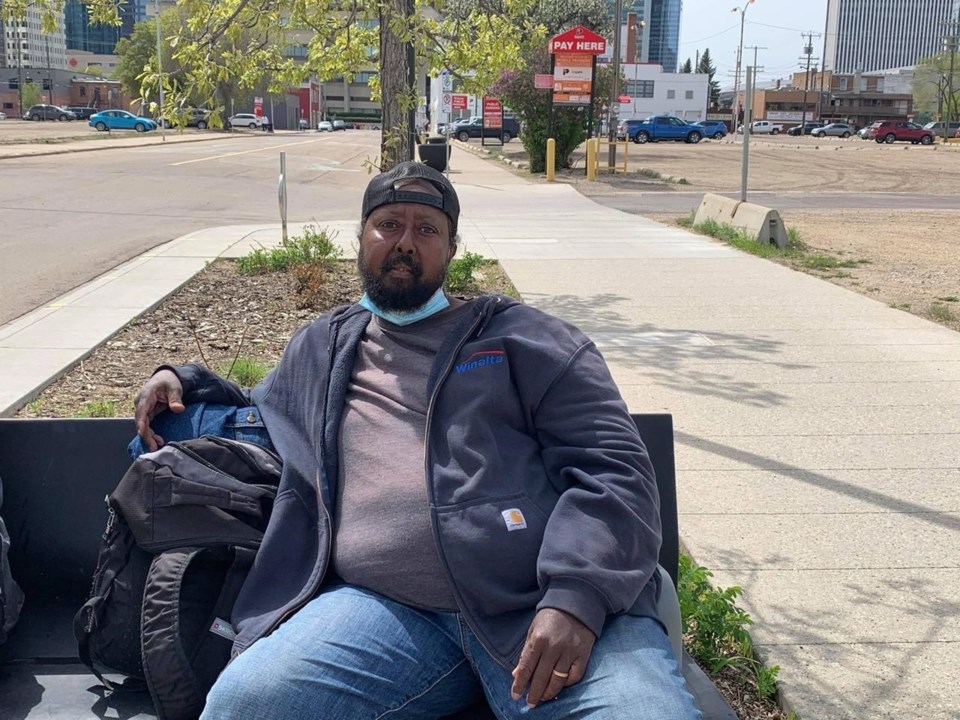EDMONTON — Jamal Awl says it was difficult to return to a central Edmonton park after he watched three friends die together there last week from an apparent opioid overdose.
The 55-year-old construction worker says he talked to the three men at Kinistinâw Park, in the city's downtown, about 1 p.m. Friday.
Awl says the trio regularly met at the park, which translates to 'us three' in Cree, for drinks. They had invited him to join them that day, but he declined because he quit drinking two years ago.
He ran some errands then went back three hours later, he says. He saw a girlfriend of one of the men fall from a park bench. He then noticed his three buddies on the ground.
"When I look I see the tragedy," says Awl, pointing to the bench in the Boyle Street neighbourhood.
"I don't sleep that night because I know them so long time. I don't even sit in the park since Friday."
Awl says one of them was blind and homeless, but described him as a brilliant man.
"I remember we used to sit together in -40 at homeless shelter," Awl recalls.
"I can't take it. Three people ... dead at once in broad daylight."
Alberta Health Services said paramedics attempted to resuscitate three people who were in cardiac arrest at the park, but they were pronounced dead at the scene. Health officials wouldn't confirm their cause of death due to privacy concerns. Police said it was a non-criminal matter.
Katherine Thompson, a spokeswoman for Alberta Justice, said the office of the chief medical examiner also can't share information about such cases.
Friends of the three men and an advocate said they believe they overdosed.
"If three people have died, and the medical officials describe it as a cardiac arrest, I would think that overdose is the most likely cause," said Petra Schulz, founder of Moms Stop the Harm, a national network of families that works to reduce the stigma, harms and deaths related to substance abuse.
Schulz, whose son died from an overdose in 2014, said the network has noticed a 25 per cent increase in people who are grieving from overdose deaths reaching out for help in the last three months.
A federal report in December notes there were 1,628 apparent opioid toxicity deaths between April and June of last year, when the first wave of the COVID-19 pandemic hit. It was the highest quarterly count since national surveillance began in 2016.
It also says Western Canada was the hardest hit.
In Alberta, provincial government data shows opioid-related deaths almost doubled to 1,144 in 2020, up from 521 in 2019.
Schulz said two brothers were also found dead after apparent overdoses inside their Edmonton apartment in early May.
She said front-line workers are traumatized and overwhelmed, and she's angry at the government.
"There's just not enough done about it," she said. "They have cut services that keep people safe, such as safe consumption sites. They are not addressing the drug supply that has become increasingly toxic."
Schulz said the government needs to "have a heart" and look to harm reduction.
"These deaths are preventable," she said. "This needs to end. We cannot allow for this to go on."
Alberta's department of mental health and addictions said the government is working with Edmonton police and other agencies to address the issue.
"Pandemic-related measures continue to take a toll on people struggling with addiction," spokesman Justin Marshall said in an email.
"We are committed to a high quality and easily accessible system of care for both mental health and addiction that includes a full continuum of supports, including services to reduce harm."
As Awl stares at the park bench where he lost his friends, he says he knows too many people who have died from overdoses.
"One moment they're alive," he says. "The next moment, they're gone and nobody cares."
This report by The Canadian Press was first published May 27, 2021.
----
This story was produced with the financial assistance of the Facebook and Canadian Press News Fellowship.
Fakiha Baig, The Canadian Press




